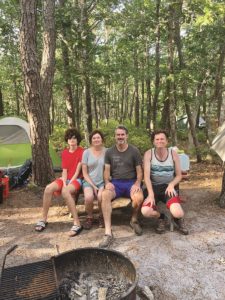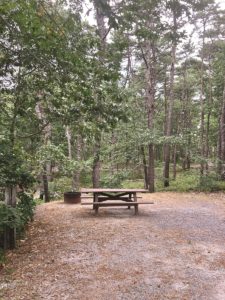WELLFLEET — A simple, affordable escape to the natural beauty of Outer Cape Cod grows ever more elusive as real estate and rental prices skyrocket. And Wellfleet Hollow State Campground, previously Paine’s Campground, one of the few remaining woodsy refuges here, is open only three nights a week this summer because of a staff shortage.
The Mass. Dept. of Conservation and Recreation (DCR), which runs the campground, arrived at the decision to limit operations on June 21, according to DCR spokesperson Carolyn Assa, resulting in lots of disrupted plans for campers who had reserved longer stays.

Linda and Dave Goodrich of Boston have been coming here for 25 years and have watched their children, now 14, 19, and 33, grow up at the campground. They’ve tried renting but much prefer both the price and tranquility of camping. They mourn the loss of a longer visit, noting that in the past they’ve stayed for up to two weeks. Still, they’re grateful for any time at what they consider a special place.
“We’ve rented places before, but this is better,” says Linda, nodding at the two sites her family is temporarily calling home, furnished with two tents, a hammock, a firepit, and a picnic table.
“It’s economical, it’s closer to nature, and my kids have learned how to make campfires; they’re not afraid of bugs or pond swimming, and they feel like they belong here,” she says. “It’s all of the things you could want for your kids.”
While a basic hotel room in Wellfleet goes for more than $200 a night and a rental home for $400 or more, $22 and a one-time investment in a tent can get you “your own little slice of heaven” at Wellfleet Hollow, Dave Goodrich says.
“You get to know your kids in a different way,” says Linda. The family’s favorite times at the Cape are spent around the campfire telling ghost stories.
The 30-acre campground offers 55 sites. A trail leads to Duck Pond, a freshwater oasis. And with the Cape Cod Rail Trail being extended a mile this year and now ending here, campers can commute from their sites to the beach on two wheels. “We don’t have to get in our car the whole time we’re here,” says Dave. “You can unplug a little bit.”
Perhaps best of all is the walkable fire road that leads to White Crest Beach, one of the four ocean beaches Wellfleet manages in the National Seashore. The Goodriches remember wielding flashlights on a night hike to the beach to stargaze. With minimal light pollution, the Cape Cod night sky is breathtaking.
Like many of this year’s weekend campers, the Goodriches wish they could stay longer.
The DCR staff shortage is not unique. Across the Cape this summer, businesses and recreation programs have struggled to hire a full complement of seasonal workers. Assa noted that the DCR has had difficulty finding workers ever since the pandemic started.
The high cost of rentals here during the summer is affecting potential workers as well as those seeking simple, affordable camping vacations.

Buddy Paine, who owned the campground from 1999 to 2018, says his family figured out how to attract and compensate summer workers. They offered employees a free campsite for the summer, an approach that attracted a wide array of “work campers,” typically people who travel around the country working and living at campsites. Many of these were older semi-retired people, á la Nomadland.
The DCR’s Assa says employees of the campground are not permitted to live there. The two full-time employees and one part-time employee who staff the campground are all year-round residents of the Cape. Assa would not say how much campground workers are paid, but the average salary for a seasonal laborer at DCR is $33,341 per year, according to GlassDoor, a reference site for jobseekers. If campground employees must find their own housing on the Cape, real estate and rental prices would pose insurmountable barriers.
The effort to keep the campground running has been complicated. In 1999, when Buddy Paine took over the campground that his parents had run, he hoped to acquire a title to the entire property, which was divided into several parcels. Some did not have clear titles.
The Sexton family, as reported in the Independent on July 14, claimed they owned several parcels, leading to a 21-year legal battle. The Paines eventually won, but at the cost of more than $1 million in legal fees. Had the Sextons won the case, the campground might have been divided and sold to developers.
The Paines decided they were ready to part with the campground and considered many avenues, including selling to affordable housing developers, according to Buddy. But legal complications got in the way. Buddy’s former wife, Sheila, wanted the campground to stay a campground, giving future generations the same access to a nature-based vacation, he says. So, the state cut a deal with them: they took the campground by eminent domain with a $3.6 million payment and the guarantee that the campground would remain intact.
Since then, the state has renovated the bathroom building and removed a few campsites to make the campground less dense — changes campers agree are welcome improvements. They just wish they could enjoy them for more than three days at a time.
